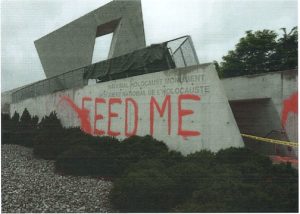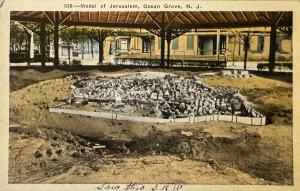Toronto filmmaker Francine Zuckerman always wanted to travel with her father, Jack, to Poland. Jack fled Poland in August 1939, two weeks before the war broke out. He was fortunate to make it to Canadian soil, as the “none is too many” immigration policy closed the country’s doors to Jewish immigrants.
But they did not get a chance to visit Poland together before he died in 1992. “Even though our family had this negative impression of Poland, he really didn’t,” she says. “He wanted to connect, he wanted to show me but we never got a chance to go.”
However, when Zuckerman spoke with people she met on an earlier film she directed, the Gemini Award-winning Half the Kingdom, they told her about a new wave of Jewish life developing in Eastern Europe. Zuckerman says she had believed that there were no Jews left in Poland.
She knew it was time to head to her father and mother’s birthplace.
In Poland, Zuckerman became one witness to the birth of this cultural and religious revival.
Her new documentary, We Are Here, tells the story of several Polish Jews who live under the shadow of the Holocaust and the new efforts to rebuild Poland’s Jewish community. Zuckerman dedicated the film to her parents.
The first time she visited was during the 65th anniversary of the Warsaw Ghetto Uprising. From this maiden visit, she started contacting Jewish citizens.
“Each time I went back, I put little pieces of the puzzle together,” she says. “Slowly I started to understand what was really going on in Poland. It’s 20 years after Solidarity and the fall of the [Berlin] Wall. There’s a new world that’s opened up. It’s almost hip now to say, ‘I’ve got Jewish roots.’”
One woman she met at the Ghetto Heroes Monument during her first visit was Irena Likierman, a Holocaust survivor who became one of the documentary’s five Polish-Jewish subjects.
Likierman was only eight when Nazis forced her family into the Warsaw Ghetto. She would later escape from the ghetto and hide in several homes before returning to Warsaw after the war. Likierman chose to stay in Warsaw but changed her name and hid her Jewish identity.
“When I go to the [Ghetto Heroes] monument, that’s how I feel connected to my family,” Likierman told The CJN.
Likierman struggled to find her place in Poland after the war. However, Polish Jews growing up in a post-Communist era are finding more comfort in the nation’s slowly developing Jewish community.
One of these Jews, Ania Ciszewska, works for Limmud, a UK-based organization focused on educating people about Jewish life, history and events. The agency also connects people to their Jewish roots. Ciszewska says the job is important to her because it reminds her of her own realization that she was Jewish.
Ciszewska started to discover her faith as a child, even though her parents had repressed their religious identity. In high school, she became more attached to her Jewish identity through the Holocaust literature she read in her classes.
This was a key learning curve for her, since history classes in Poland skim over World War II, she says. But once she became interested in knowing more about Judaism, Ciszewska did not let up.
“I joined the Jewish Senate Organization and I went on Birthright,” she says. “It was like this kick for me. I started to run the Jewish holidays at my place. I invited my mom and my sister and some of my friends and we did it together.”
However, Jewish family celebrations are still more difficult to do in Poland. “There are many kids like me, who want to bring [Judaism] to the house, but the parents [and] the grandparents do not want it,” Ciszewska says.
The estimated number of Jews living in Poland ranges from estimates of around 10,000 to 100,000. Although a 2010 census showed that around 10,000 Jews lived there, many have either not yet discovered this identity or do not identify as Jews.
“I was sitting in a café in between shooting. I look over and I see somebody who totally looks Jewish to me,” Zuckerman says. “I was watching her, and I thought, I bet she doesn’t know [she is Jewish]. That was probably the most profound thing for me. I grew up with this entire sense of who I am as a Jew. They didn’t.”
Although Jewish life has begun to spring into Warsaw, anti-Semitism remains. This intolerance is more rampant in smaller towns like Lublin, where Jews are not an active part of the community.
We Are Here took Zuckerman six years to make. It will preview at the Royal cinema in Toronto on Dec. 3 and is set to air on the Documentary Channel on Dec. 9. Zuckerman says she hopes to get We Are Here into next year’s Jewish Film Festival in Toronto, as well as international festivals.
Earlier this month, the film screened at Warsaw’s Museum of the History of Polish Jews. The museum, set to open in September 2014, was built on the ground that used to be part of the Warsaw Ghetto. The screening this month brought Zuckerman’s journey full circle.
“When I was there for the 65th anniversary of the Warsaw Ghetto Uprising, the president of Poland and the president of Israel got together,” she says. “They walked from the monument for the people who died during the Warsaw Ghetto Uprising to the new site of the Jewish museums. We realized we were moving from commemorating the death to acknowledging the life.”






